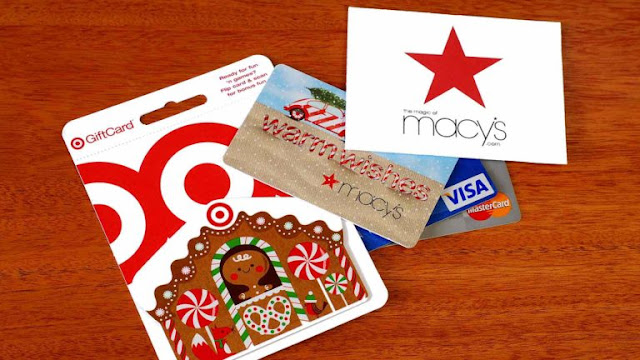How to buy and sell Gift Card
Gift cards, both cash cards and store specific ones, have become popular for birthdays, graduations, and all other “gift giving” occasions. They present a handy way to personalize an individual gift, while still allowing the recipient to pick out what they like.
In this article, we’ll go over the different types of gift cards, why retailers offer them to customers, and how you can get the most for your money when buying them or using them for yourself.
Gift Card Basics
First, make sure you understand the two different types of gift cards:
1. Cash Cards
Cash cards can be used anywhere, and they’re sponsored by companies like Visa, MasterCard, Discover, and American Express.
- Good news: These cards offer the greatest flexibility, since you can use them basically anywhere that credit cards are accepted. It’s practically the same as carrying cash. You can even use it to pay bills online. They save many of us the hassle of returning that too-small sweater for the right size, or trying to find the specific store that will take back the book we already own.
- Bad news: As a gift, these are the least personal option available. It’s essentially a substitute for giving cash, so while your recipient will appreciate it, it’s not a great gift for a close friend.
2. Store Cards
Store cards are specific to a particular retailer, such as Macy’s, Banana Republic, and Victoria’s Secret.
- Good news: These cards give you a chance to get more personal with your gift. For birthdays, graduation, or a “just because” present, a store card is a better way to show you care and know their interests. Moreover, the recipient is more likely to get a special purchase to enjoy than they would if you gave a cash card.
- Bad news: It’s great that so many stores offer gift cards, but they all have their own internal policies. Especially at local shops, you need to be verycareful about expiration dates. For example, some cards or certificates are only valid for 90 or even 30 days. Often you’ll find a demurrage policy in the fine print, which means that the card loses a little bit of value every month. Thus, you might give a friend a $50 card, but after losing $2.50 a month, your friend might be surprised to learn that the four-month old card is only worth $40.
Who Loves ‘Em?
Why sellers offer gift cards
Stores love gift cards. From the largest chains to the smallest mom and pop shops, you’ll find gift cards at almost any retail store. The reasons are simple:
- Selling a card means upfront revenue for the store, but whether or not anyone redeems the card is uncertain. People lose cards, forget about them, or just decide not to use the last few dollars. That’s music to a retailer’s ears. Stores immediately get the cash, and they can only come out ahead. You’ll either use the full value, leave the cash on the table, or buy even more product in the end.
- That last one is the big one. When you redeem your gift card, chances are you’ll go over the initial value of the card. You’ll spend a little bit more, and you’ll probably end up coming back as a repeat customer.
As these trends emerge, companies that process rebates are starting to distribute gift cards rather than cash or checks. As a result, they’re saving a ton of money when people don’t redeem their cards’ full values.
Why banks and credit cards are happy
Credit card companies have been getting in on the act for a few years. They’ll encourage stores to have more robust gift card programs by helping with logistics and promotion. They win in the end, since they get a cut of merchant fees when shoppers redeem the cards.
Why consumers should still love cards
With retailers and banks reaping extra revenue, are buyers always getting the raw end of the deal? If you don’t want to be the loser in the equation, you need to empower yourself. Your goal should be to keep retailers from reaping the benefits of wasted cards. Don’t hoard your cards; instead, follow some of these tips to be a gift card winner.
How to Win the Gift Card Game
It’s up to you to be a smart gift giver and a smart card user if you want to be a winner in the gift card game. Consider these three factors for gift cards:
1. Flexibility
Cash cards are convenient because the recipient can use it anywhere that major credit cards are accepted. On the other hand, store gift cards can only be redeemed at the specific retailer. Moreover, most retailers will not allow you to exchange store cards for cash.
Cash cards are convenient because the recipient can use it anywhere that major credit cards are accepted. On the other hand, store gift cards can only be redeemed at the specific retailer. Moreover, most retailers will not allow you to exchange store cards for cash.
2. Cost
Store cards usually do not have additional charges and are good for their face value. However, cash cards, such as Visa, charge a fee when issuing the card. A $50.00 face value card will incur an additional charge from $1.00 to $5.00 for the buyer. Cash cards will also start charging a maintenance fee after 12 months, which ranges anywhere from $2.50 to $5.00 a month. This can drain the card pretty fast. Therefore, you must make sure these gift cards are used within the first 12 months after they’re received, or the card could end up worthless.
Store cards usually do not have additional charges and are good for their face value. However, cash cards, such as Visa, charge a fee when issuing the card. A $50.00 face value card will incur an additional charge from $1.00 to $5.00 for the buyer. Cash cards will also start charging a maintenance fee after 12 months, which ranges anywhere from $2.50 to $5.00 a month. This can drain the card pretty fast. Therefore, you must make sure these gift cards are used within the first 12 months after they’re received, or the card could end up worthless.
3. Expiration
The store cards are better in this area as well. Most retailer gift cards have no expiration date. However, if the store goes out of business, you will be unable to use or redeem the card. On the other hand, cash cards usually have an expiration date of 5 years from the date of issue. This seems like a long time, but if you forget about the card or it falls behind the dresser, the value of the card can quickly disappear either due to expiration of maintenance fees.
The store cards are better in this area as well. Most retailer gift cards have no expiration date. However, if the store goes out of business, you will be unable to use or redeem the card. On the other hand, cash cards usually have an expiration date of 5 years from the date of issue. This seems like a long time, but if you forget about the card or it falls behind the dresser, the value of the card can quickly disappear either due to expiration of maintenance fees.
Choosing the Right Gift Card
Do your friends and family members a favor and consider if they’ll actually use the gift card you want to give them. Sure, they may love the idea of getting a massage or a new pair of shoes, but is it what they truly want or need? Take some time to consider their interests and hobbies before choosing a gift card.
For example, do they like to go out to dinner? Then, maybe a card to their favorite restaurant would be appropriate. If the person is a really picky gift recipient or simply seems to have everything, just go with a standard cash card accompanied by a thoughtful note. They’ll appreciate the gift card and the flexibility that comes along with it.
For example, do they like to go out to dinner? Then, maybe a card to their favorite restaurant would be appropriate. If the person is a really picky gift recipient or simply seems to have everything, just go with a standard cash card accompanied by a thoughtful note. They’ll appreciate the gift card and the flexibility that comes along with it.



Comments
Post a Comment